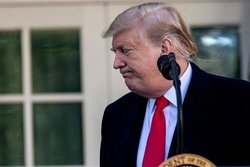 US President Donald Trump has wrongly claimed that his father was from Germany as he expressed frustration about the European country’s financial contribution to the US-led military alliance of NATO.
US President Donald Trump has wrongly claimed that his father was from Germany as he expressed frustration about the European country’s financial contribution to the US-led military alliance of NATO. RNA - Trump made the claim for a third time on Tuesday as he was meeting with NATO Secretary-General Jens Stoltenberg at the White House in Washington, DC.
"Germany, honestly, is not paying their fair share," the US president said before stressing that he has "great respect" for German Chancellor Angela Merkel and "great respect for the country."
"My father is German, was German," Trump went on to say. "Born in a very wonderful place in Germany, so I have a great feeling for Germany."
This is while Trump’s father, Fred Trump, was actually born in New York City, US, in 1905.
Trump just said "my father is German, was German. Born in a very wonderful place in Germany." Fred Trump was born in New York. pic.twitter.com/U6eWYPzjrJ
— Tommy MMXIXtopher (@tommyxtopher) April 2, 2019
This was apparently not the first time Trump has incorrectly said his father (pictured below) is from Germany.
The American head of state made the claims about his father multiple times last year while discussing relations between the US and European countries, according to a report by the Washington Post.
"Don’t forget both of my parents were born in EU sectors, OK?" Trump said in an interview last July. "My mother was Scotland. My father was Germany."
Trump's mother, Mary Anne MacLeod, was born in Scotland.
The Post noted that Trump also claimed his father was from Germany while attending the NATO summit in Brussels.
"I have great respect for Germany; my father is from Germany," Trump said. "Both of my parents are from the EU, despite the fact they don’t treat us well on trade."
But Trump’s grandfather, Friedrich Trump, was a German immigrant. He left for America at 16 and worked as a barber in Manhattan. Friedrich was at one point deported from Germany when he returned to his native country after spending time in the US for avoiding mandatory military service as a teenager.
Trump's claims on Tuesday came as he was hosting Stoltenberg at the White House ahead of the NATO chief's speech to a joint session of Congress on Wednesday.
The US president warned at a NATO summit last July that he could withdraw support for Europe if it did not share more of what he called an unfair burden on US taxpayers in funding the military alliance.
In 2014, NATO countries agreed to meet the current spending target over the next decade, pledging to spend 2 percent of their gross domestic product (GDP) on the alliance’s military spending. The alliance has estimated that only 15 members, or just over half, will be able to hit the benchmark by then.
Frustrated by the lack of "burden-sharing," Trump has time and again threatened to leave the alliance if others fail to step up contributions.
Trump has reportedly written to several NATO allies, asking them to increase their military spending for the alliance and warning the US is losing patience.
Earlier this year, Stoltenberg credited Trump with an increase in military spending from other member states, saying Washington's pressure had led to "some real results."